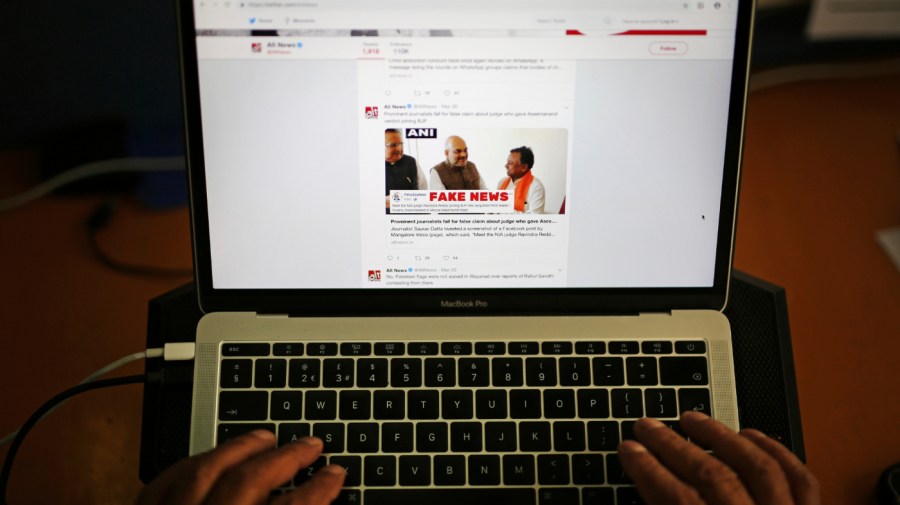
A colleague sent me a link to an article that featured me as a subject matter expert on space medicine. The article stated that I was interviewed to discuss how lessons learned from astronaut health in microgravity could be relevant to living longer and healthier on Earth.
My titles at NASA and at several academic institutions as well as quotes were highlighted throughout this article.
And it was all fake.
I was never interviewed for this article. The titles do not exist. The comments and the data are not authentic. I tried several times to contact the publication by phone and email, to no avail — so it still exists on the internet for all to read.
Fortunately, the medical information that is posted is not dangerous. However, I am concerned that some may think that there is merit to these comments, and it will affect their health decisions.
I should not have been surprised that this happened. A few years ago, I saw a segment on NBC News about the perilous impact on careers of fake online reviews. It inspired me to explore what had been written about me in the vacuum of internet space.
It’s a Wild West frontier, where reviews are posted with little or no oversight.
The perpetrators can be competitors, disgruntled colleagues or personal contacts. Among the vilest are charlatans who deliberately post fake reviews and then offer their services to remove them.
If a person is dependent on positive reviews for clients or patients or even job opportunities, these false statements can destroy their reputation.
I once had a prospective employer comment about a review regarding my private practice. I thought it was a joke since I’m not in private practice. Now curious, I searched my name to find practice review platforms associated with it — all were empty except for one.
The reviewer commented on my horrific nursing team and wait times and the location listed was my home address. It had been on the internet unchecked for months. If I was in private practice, it could have been quite damaging.
It’s easy for something to be posted on the internet and almost impossible to get it removed — a lasting legacy that can cause ripples or a tsunami by what is written by anonymous sources. As expected, there is a booming industry dedicated to sanitizing professional reputations which can be easily destroyed by the click of a mouse.
From googling my own name, I have found photographs associated with it that are not mine and affiliations listed for my public presentations that are not real. I can only imagine what else is swirling in this cesspool of fake photos, comments, reviews and perhaps even videos.
I recall recent conversations about whether videos featuring celebrities and public figures were real or products of artificial intelligence — not just the visual but also auditory components.
For example, have you received fake robocalls from politicians on your phone and/or seen photographs that were photoshopped that eventually had to be removed from platforms when people contested their veracity?
What is the public to do? How do we protect ourselves? How can organizations verify that what they are releasing to the public is accurate?
Google alerts and checking one’s name may help, but it is not foolproof. I’ve taken courses on how to detect and avoid phishing — scams designed to trick users into revealing personal information — in emails and texts.
But just like the article that quoted me, it may not be so clear cut. They are often written in a manner that can be quite convincing. Chat GPT has also made it more challenging, since it culls through what is published and generates new documents based on “hallucinations.”
Manuscripts submitted for medical journals go through extensive peer review. Articles can also be pulled post-publication if it’s revealed that there is falsified data, bias or conflicts of interest. But what happens with mainstream media outlets that do not undergo the same degree of verification?
An important clue that the article that quoted me was spurious was that it didn’t list an author. For the articles that I’ve published in mainstream media outlets, comments are rigorously checked, including references. Unfortunately, there are publications that don’t do this, and the reader may not know any better.
One of the basic tenets of our society is freedom to speak, not freedom to lie.
We need more effective policies and oversight, both at the organizational and regulatory levels. Professional societies, governmental agencies, information technology companies and the media, including social media platforms, need to work together to address these issues.
I hope you can trust this article, but I understand if you want to verify it.
Saralyn Mark, MD is a former senior medical adviser to the White House, NASA and the Department of Health and Human Services. She is the CEO of SolaMed Solutions, LLC and iGIANT (impact of Gender/Sex on Innovation and Novel Technologies), author of “Stellar Medicine: A Journey Through the Universe of Women’s Health” and host of the Always Searching podcast.












